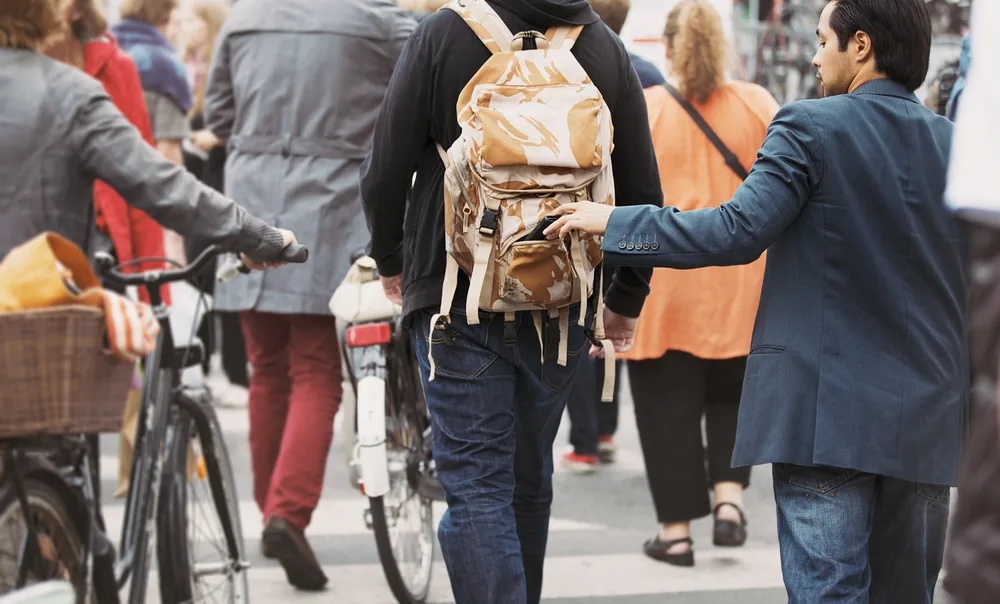Is Nova Scotia safe to visit in 2025?
Nova Scotia, on Canada’s eastern coast, is a popular tourist destination for Canadians and foreign visitors alike. Each year, over a million people visit the province. The beautiful nature is Nova Scotia’s primary draw.
Whether you go whale watching in the massive Bay of Fundy or explore the dramatic shores of Cape Breton, you will see why this city has inspired so many people throughout the ages. But while this storied city is rich in history and culture, is Nova Scotia safe to visit? Here’s our take.
Is Nova Scotia Safe to Visit in 2025?

Brendan Riley/Shutterstock
Yes, Nova Scotia is very safe to visit, and many Canadians consider it one of the safest parts of Canada. The crime rate is fairly low, even in the province’s biggest city, Halifax.
However, you should take precautions before heading into nature to keep yourself safe. Most places in Canada are safe because Canada overall is a safe country.
Countries such as the United States and New Zealand just advise their citizens to take normal precautions when visiting Canada. Problems exist in Canada just like anywhere else, such as crime and the risk of terrorism, but the risk of something bad happening to you is quite low.
Anecdotal evidence from Canadian residents points to the fact that Nova Scotia is one of the safest places in Canada.
If it is one of the safest provinces in one of the safest countries in the world, it makes sense that Nova Scotia will be safe to visit! Crime does happen in Nova Scotia.
Problems that affect tourists tend to be minor, such as:
- Pickpocketing
- Verbal harassment
- Scams
- Vehicle break-ins
Most visitors to Nova Scotia come because they are interested in exploring the beautiful nature. However, whenever you head into nature, you should make sure that you do so safely.
You don’t want to injure yourself on one of Nova Scotia’s beautiful hiking trails and not know what to do. Local authorities, parks, and NGOs share plenty of tips on their websites and in visitor centers to help people interact with nature safely.
Your best bet for researching the lay of the land before you head out is safety tips from the local governments or parks such as Cape Breton National Park.
To stay safe in Nova Scotia’s wilderness:
- Stay on marked trails.
- Research weather and trail conditions ahead of time.
- Pack layers, including a waterproof layer — it rains frequently in Nova Scotia.
- Bring more than enough water and food in case your trip takes longer than expected.
- Stay away from wildlife such as moose or bears. To keep bears away, make plenty of noise and be sure to store your food (including food waste) in bear-safe containers.
- Do not disturb nature in any way. That means no going off the trail, littering, or feeding the animals.
Although Nova Scotia’s climate is milder than the climate in most of the rest of Canada thanks to its maritime location, winters can still be harsh. If you are visiting in the winter, make sure that you pack a warm coat or parka and sturdy boots.
If you are driving, you will need winter tires. Nova Scotia, along with Canada’s other Maritime provinces, sometimes gets affected by hurricanes.
The damage is milder than in the Caribbean or the Gulf Coast of the United States since hurricanes lose their force as they head north, but storm damage can still occur. Hurricanes bring strong wind, heavy rains, and flooding
Hurricanes are most common in late August and September. If you’re traveling during this time, pay attention to any weather alerts that come in about hurricanes, and follow instructions from authorities and advice from locals.
Crime in Nova Scotia

Halifax, Nova Scotia, Canada – 10 August 2021: People enjoy sunny day at Halifax Harbourfront, Canada/Marc Bruxelle/Shutterstock
Like in almost any part of the world, crime occurs in Nova Scotia. However, it is not nearly as much of a problem here as it is in other parts of the world, or even in other provinces of Canada.
Over the past few years, Nova Scotia has had a slightly elevated crime rate. Its overall crime rate in 2022 was 5,973.3 incidents per 100,000 people, which was around the national average.
Nova Scotia’s crime rate increased in 2022, but that was comparable to other provinces. Crime increased throughout Canada in 2022 due to the end of COVID-19 lockdowns, so comparing the crime rate to 2021 is a bit of a statistical anomaly.
However, when you look at the breakdown of crime by type, then you’ll see why Nova Scotia is considered so safe. The vast majority of crimes that occur in Nova Scotia are property crimes.
Although property crimes certainly affect the lives of victims, they are less traumatic than violent crimes. The Crime Severity Index helps to analyze crimes by their magnitude.
The Crime Severity Index is a Canadian police statistic that instead of calculating the total number of crimes per population regardless of the type of crime, calculates an index based on the magnitude of the crime.
In 2022, Nova Scotia’s crime severity index was 74.67.
For comparison, the national value was slightly higher, at 78.10. According to breakdowns of violent crime by province, Nova Scotia has the 4th lowest crime rate in Canada.
The provinces that are safer are Quebec, Ontario, and Prince Edward Island. The violent crime rate in Nova Scotia in 2021 was 1,498.4 incidents per 100,000 people.
Not all of Nova Scotia is the picture-perfect place you see on postcards, and obviously crime still occurs in the province. However, the crime rate is lower than the national average, and most crimes that happen are property crimes and non-violent.
Pickpocketing

Jacob Lund/Shutterstock
The most common crime affecting tourists pretty much everywhere is pickpocketing. Especially as Nova Scotia gains a reputation as a popular tourist destination, more and more thieves will be looking to take advantage of the growing crowds.
Pickpockets operate around popular tourist attractions, popular shopping areas such as malls, and in crowded streets. When you are around plenty of people, make sure that you put your valuables in a secure place.
You don’t want to put your phone or wallet somewhere where a person could brush against you and take it, such as your back pocket. It’s better to put your important possessions in a zipped bag or front pocket where you can physically hold on to it in a crowd.
One trend authorities are warning residents and tourists about in Nova Scotia is electronic pickpocketing.
Now that most bank cards are touch-friendly and many people use e-wallets on their phones, thieves have new ways of taking your money. Electronic pickpockets use RFID-readers to access a person’s card information, and then tap away to withdraw money.
To prevent electronic pickpocketing, invest in an RFID-proof wallet, bag, or phone case. These gadgets use metal or foil lining to scramble the signal of an RFID reader and prevent this form of pickpocketing.
Although scams are not as common in Nova Scotia as in other popular tourist destinations, it is still a good idea to be on the alert for this type of crime.
One common type of scam is people trying to pass off inferior products as high-quality products, such as “authentic” artisanal souvenirs, which can sell at higher prices. Inspect items carefully before buying them to see if they are worth the price.
When booking travel in Nova Scotia, you should also be careful of deals that seem too good to be true. Vacation rentals that are half the price of similar accommodation nearby.
Or, you might encounter tours that offer deep discounts, and travel agencies that promise endless trips for little money are often fronts for scammers who take your deposit and then disappear. It helps to read independent reviews before booking anything in advance.
Vehicle Break-Ins
Other forms of theft are common in Nova Scotia, such as vehicle break-ins. Vehicle break-ins are particularly common in the provincial capital, Halifax, but they can also happen in other places, such as popular trail heads and national park parking lots.
Thieves are often serial offenders with strings of break-ins under their belt. To protect from vehicle break-ins, don’t leave any possessions visible in the car.
Something as small as some loose change or a phone charger can incentivize someone to break into your car. Put items away in your glove compartment or trunk. Try not to drive around with shopping bags or luggage.
Head straight to your accommodation after shopping or before exploring. If you are driving around with possessions in your car, don’t open your trunk when you stop because you don’t want someone to see what is in it.
Finally, never, ever leave your valuables in your car, even if you are just stepping out to get gas.
You never know who might be looking to take advantage of a moment’s inattention. If you don’t leave anything valuable in your car, even if it gets broken into, you minimize the impact on your life.
Avoiding Bad Areas

Russ Heinl/Shutterstock
The provincial capital, Halifax, has a few sketchier areas. Locals advise against going on Hollis Street around the train station or between McDonald Bridge and Gottingen Street after dark, as these areas are a bit sketchier.
Most other dangerous areas of Halifax are far away from typical tourist areas. You should also be careful in the town of Dartmouth. Although a popular day trip from Halifax, its downtown area feels run-down, even during the day.
Things to Consider

everst/Shutterstock
Here are a few additional safety tips for visiting Nova Scotia:
- Be careful when driving if you are renting a car. In the winter, road conditions get difficult, especially if you are not used to driving in snow, rain, and ice. Many Nova Scotia roads are winding and poorly lit in rural areas. When in doubt, go slow and steady.
- Prepare for the weather. The weather changes quickly in Nova Scotia, and it can rain just a few hours after there was not a cloud in the sky. Always pack a waterproof layer with you, especially if you are going to be spending a lot of time outdoors. Check the forecast before heading on any outdoor activities.
- Wear long pants when hiking, even in the summer. The woods and fields in the area have ticks. Check yourself for ticks after being in nature and remove them carefully — some carry Lyme disease.
Frequently Asked Questions

Curtis Watson/Shutterstock
Here are some other common questions people ask about Nova Scotia:
Is Nova Scotia good for tourists?
Nova Scotia is great for tourists! Not only is there a lot to see, but it is also very safe and has great tourism infrastructure!
Is Nova Scotia safe at night?
The answer depends on where you are. Smaller towns are usually safe at night, but parts of the capital, Halifax, can feel more dangerous.
Is Nova Scotia friendly?
Residents of Nova Scotia are generally friendly to visitors. The stereotype that Canadians are very nice is often accurate!
Is Nova Scotia good for immigrants?
If you have long-term plans for Nova Scotia, you’ll be happy to find out that Nova Scotia is good for immigrants. It is less expensive than popular destinations such as Toronto and Montreal, but still has all the benefits of living in Canada.
Do they speak English in Nova Scotia?
English is the main language in Nova Scotia. There are some French speakers in the province, especially in Cape Breton.
Over to You — Book Your Trip Today!
Nova Scotia is the perfect place for a safe, fun vacation. Just make sure that you prepare properly for heading into nature and save the local emergency rescue number in case anything happens.
So, with so much to see and do, what are you waiting for — book your trip today and experience for yourself all that Nova Scotia has to offer. Happy travels!



